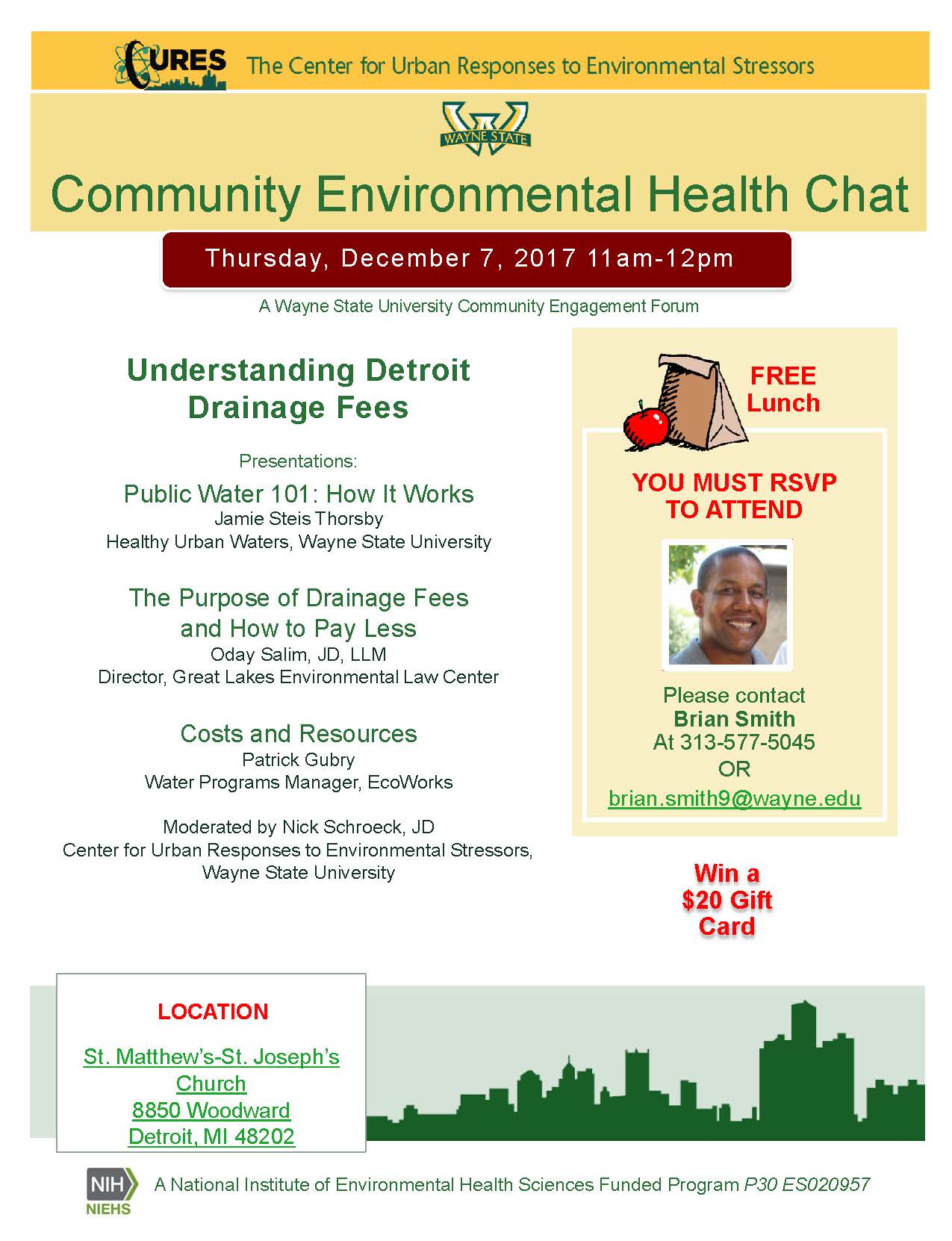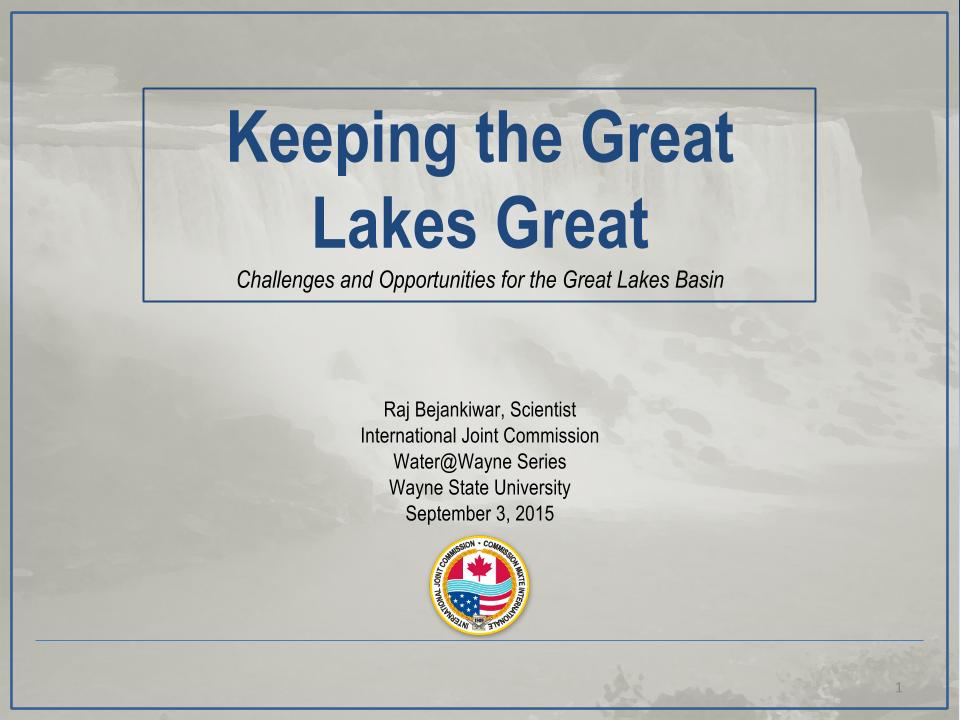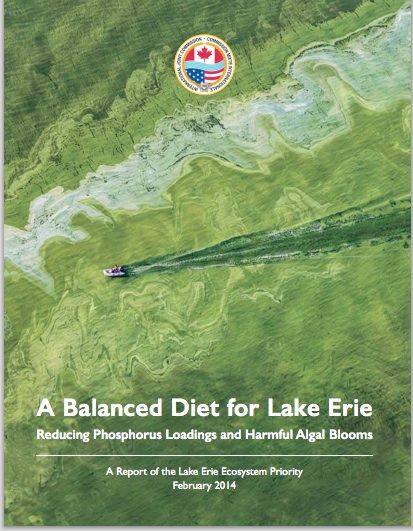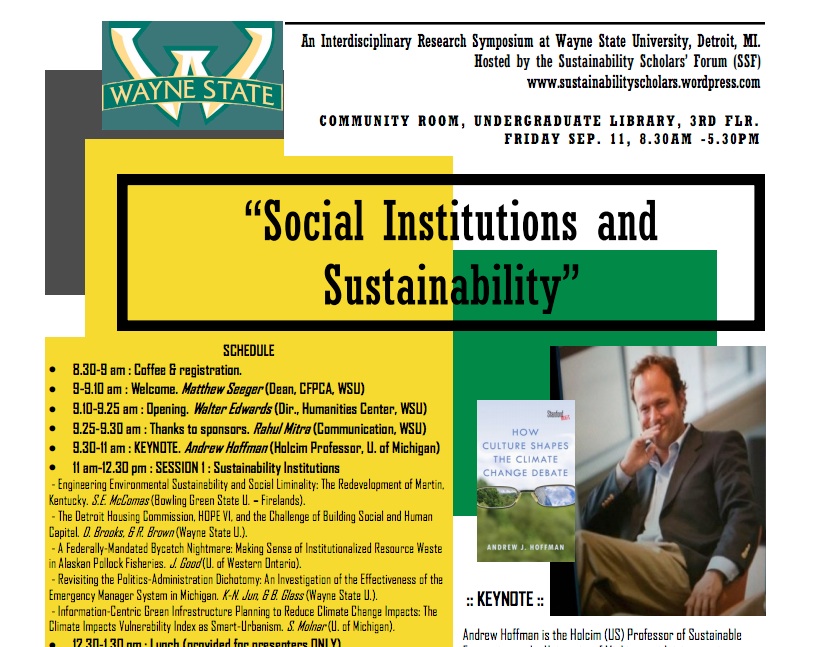Events
Upcoming events
Great Lakes Water Authority Healthy Urban Waters: 2022 Spring Water Research Symposium
May 17, 2022 12 noon to 2:00 pm
Theme: Short "One Shot" overviews of GLWA-funded and/or supported research related to potable and wastewater, including source water, throughout Southeast Michigan
When: Tuesday, May 17, 2022, from 12 noon to 2:00 pm.
Where: Teams virtual meeting
Presenters: Academia, external practitioners, and internal GLWA team members
Audience: All interested parties are invited and welcome to attend. GLWA member partners, water and wastewater utilities, and other internal and external water system collaborators are encouraged to attend.
If interested in attending, please contact Lori Bryon, Bridgeport Consulting, lori@bridgeportllc.com and John Norton, GLWA, john.norton@glwater.org
Ongoing events
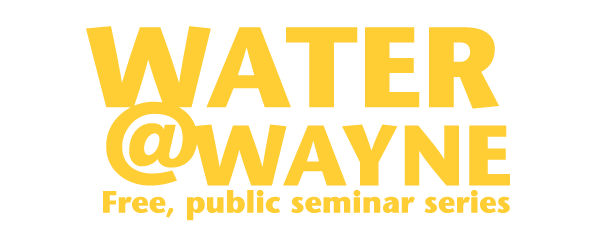
The Water@Wayne seminar series features visiting speakers from academic, industry and government backgrounds sharing research about issues affecting Great Lakes and global waters. The series is hosted by the Office of the Vice President for Research. Visit the Water@Wayne page for more information.
When: selected Thursdays from 2:30 p.m. - 3:30 p.m. during the Fall and Winter Semesters
Cost: The seminar is free and open to the public
![]() Science Saturday is a monthly family-friendly science presentation at Detroit's Belle Isle Aquarium featuring guest speakers lead interesting science journeys about aquatic and terrestrial topics and especiallt invasive species. Free and open to the public at the Belle Isle Aquarium.
Science Saturday is a monthly family-friendly science presentation at Detroit's Belle Isle Aquarium featuring guest speakers lead interesting science journeys about aquatic and terrestrial topics and especiallt invasive species. Free and open to the public at the Belle Isle Aquarium.
Where: Belle Isle Aquarium, 900 Inselruhe Avenue, Belle Isle State Park, Detroit, MI, 48207
When: Every second Saturday at 12 pm, 1 pm, and 2 pm
Cost: Free and open to the public
Belle Isle Aquarium
The Earth and Environmental Science Seminar Series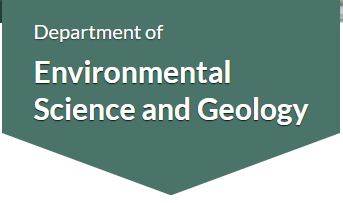 is offered by the Department of Geology and Environmental Science Program at Wayne State University.
is offered by the Department of Geology and Environmental Science Program at Wayne State University.
Where: Biological Science Room 1167
When: Wednesday at 3:00pm
Cost: Free and open to the public
Seminars cover topics related to the environment, including stormwater treatment design, coral reefs, and fracking. For a list of upcoming seminars, see the E2S3 site.
Event archive
December 2 and 3, 2021
Urban One Health Symposium
May 11, 2021
Technical Webinar Timing of Electrical Loads
See more here
March 26, 2021
GLIER & T-RUST Virtual Seminar Series "Communities and Climate Change",
March 25, 2021
CE6190 Groundwater Hydraulics Class: Guest Speaker Melinda Erickson
Her talk described aquifers, processes, and activities that influence the concentration of contaminants in drinking water aquifers. Find out more here
March 11, 2021
Women's History along Detroit's Riverfront
For Women's History month, the Detroit Riverfront Conservancy sponsored a virtual tour of notable women in Detroit. The event is free, but donations to the Conservancy are always welcome. See virtual tour here.
March 10, 2021
FLOW Webinar: Deep Threats to Our Sixth Great Lake: Spotlighting and Solving Michigan's Groundwater Emergency
A Zoom webinar hosted by FLOW provided insight and commentary on the state of Michigan's groundwater and what can be done to better protect the source of drinking water for 45% of Michigan's population.
February 4, 2021
Friends of Chandler Park Meeting : HUW researchers presented on Groundwater Monitoring Project in the Park.
Find out more about the park here.
January 28, 2021
St. Clair Detroit River System Initiative Webinar on Nutrient Loading and Contaminants
This seminar featured HUW researchers and others to discuss CECs in the Detroit area..
• Dr. Don Scavia and Ms. Lynn Vaccaro, University of Michigan - "Reduced loading from regulated and unregulated sources of total phosphorus and dissolved reactive phosphorus entering western Lake Erie"
• Dr. Bridget Baker and Dr. Tracie Baker, Wayne State University "Persistent contaminants of emerging concern in the SCDRS: implications for future investigations"
Afterwards, they discussed nutrient and contaminant indicators related to general habitat and environmental targets for the system identified under the SCDRSI 5-year plan. Find out more about SCDRS.
January 27, 2021
HUW Symposium, "One World, One Health, One Water
Healthy Urban Waters (HUW) at Wayne State University hosted "One World. One Health. One Water.", a symposium which explored the urban aquatic environment within a One Health context. See online video.
December 10, 2020
Air Emission Controls on Coal Fired Power Plants", with Joseph Klobucar
Joseph M Klobucar, of Klobucar Engineering is a Professional Engineer specializing in air pollution control technology with 34 years of industry experience. He holds a BS degree in Applied Mathematics, Engineering, and Physics from the University of Wisconsin and a MS degree in Environmental Engineering from the University of Washington. He has designed and developed innovative technology, and most recently managed the engineering and delivery of major emission control upgrades to coal fired power plants. He will be speaking on design of coal fire plants, regulations and emission controls. This presentation was part of the Energy Emission Environment graduate course at Wayne State University.
December 4, 2020
AWWA's webinar on AI For Plant Management: Leverage Big Data + Algorithms To Reduce Your Carbon Footprint & Energy Costs
Dr. Carol Miller and industry-leading peers talked about the LEEM tool (Locational Emissions Estimation Methodology) and its value in helping your plant achieve its carbon and energy reduction goals. The LEEM AI works behind the scenes bringing together big data and a world-class algorithm to make achieving plant operational goals simple and extremely cost effective. Implementing LEEM is as easy as reading an email and flipping a switch. LEEM has been used effectively by water treatment plants across the country. This webinar will allow attendees to: (1) evaluate the value proposition of emission reduction activiites by water treatment plants, (2) understand potential use cases for shedding, shifting, and storing electricity, and (3) learn behavioral approaches taken to reduce emissions and energy costs by water industry peers, as well as the impacts achieved. Handouts.
August 17, 2020
Foundations of Social Justice for Engineers
The American Society for Engineering Education (ASEE) hosted a webinar with Brenda Bryant (Marygrove College) and Carol Miller (Wayne State University) who spoke on the burgeoning issue of social justice and what roles engineers can play in tackling broad societal challenges. They introduce key concepts of social justice, provide case study examples within a Detroit context to illustrate social justice issues and explores ways in which engineers and engineering educators can ground their practice in these concepts. The Engineering Society of Detroit (ESD) co-sponsored this webinar .
October 21, 2020
Rouge River Archive presented at Engineering Society of Detroit
Barb Aylesworth and Clayton Hayes presented WSU's Rouge River Archive to ESD's Affiliate Council. The council, a group of professional associations related to engineering and architecture disciplines, meets monthly to exchange news, educational events and participate in joint charitable initiatives. Ashley Lesser , representing The Society of Women Engineers, said "there is a lot of value of having a public archive" to use with her professional civil engineering work, and elsewhere. The Archive holds 446 documents and artifacts. (Type in "Rouge River Archive" in the search line.).
July 25-27, 2019
Reimagining Water: Linking Sustainable Urban Water Systems in the Great Lakes Basin
November 12, 2019
WSU-GLWA Symposium
May 20, 2019
A Dip in the Water Symposium
Understanding Detroit Drainage Fees
One of our partner organizations, CURES, will be holding a community engagement forum to discuss the drainage fees in Detroit on December 7, 2017 at 11am. It will take place at St. Matthew's-St. Joseph's Church at 8850 Woodward in Detroit. One of our HUW staff will be speaking at the event. If interested in the event, please RSVP to Brian Smith at 313-577-5045 or brian.smith9@wayne.edu.
March 31, 2017
WSU SOM Pharmacology Seminar hosted by Tracie Baker
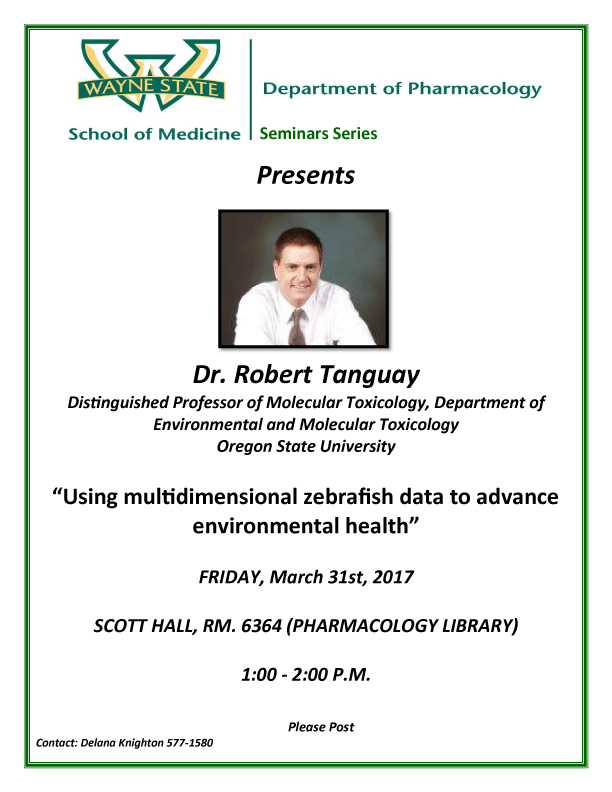
Abstract: The field of toxicology is challenged to understand the biological activity of huge swaths of chemico-structural space to identify the chemical exposures that actually pose a risk to humans. The research community is increasingly moving toward the utilization of high-throughput (HT) approaches to capture and predict chemical activity. Much of this work is conducted in cell-based systems as these research platforms are cost effective. A major challenge accompanying in vitro data streams for decision making is that they often lack meaningful biological context. Over the past several years, we have aggressively advanced the use of zebrafish to rapidly identify and classify chemical activity. To achieve these goals, we have developed and implemented high throughput screening infrastructure, methods, and data analysis tools to rapidly evaluate the activities of individual chemicals and complex mixtures of chemicals. This presentation, through illustrative examples, will highlight the advantage of the zebrafish system for rapid hazard identification, in vivo mechanistic evaluations and predictive toxicology.
April 21, 2016 from noon to 1 p.m.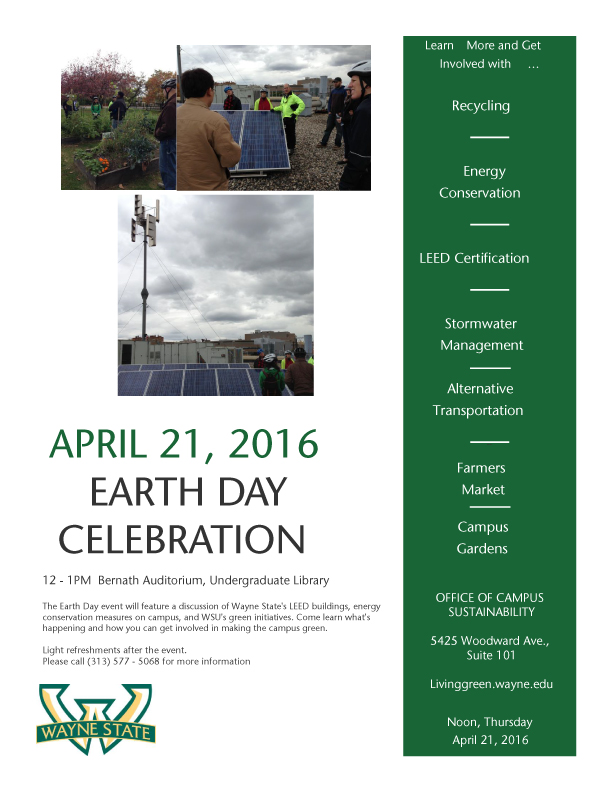
WSU Earth Day Celebration
Bernath Auditorium
David Adamany Undergraduate Library (UGL)
5150 Anthony Wayne Dr. | Detroit, MI 48201
The Earth Day event will feature a discussion of Wayne State's LEED buildings, energy conservation measures on campus, and WSU's green initiatives. Come learn what's happening and how you can get involved in making the campus green.
Light refreshments after the event.
Please visit Livinggreen.wayne.edu or call (313) 577-5068 for more information
Hosted by the OFFICE OF CAMPUS SUSTAINABILITY | 5425 Woodward Ave. | Suite 101
April 28, 2016 from 10 a.m. to 1:30 p.m.
An Amazing Water Education Experience for Middle School Students along the beautiful Detroit River on Belle Isle!
Come Join UWERG's Dr. David Pitts on April 28, 2016 on Belle Isle for the 5th Detroit River Water Festival, A premier water education event for Middle School Students in the Detroit area. Learn More -->
Thursday, April 14, 2016 | 2:30 p.m. - 3:30 p.m.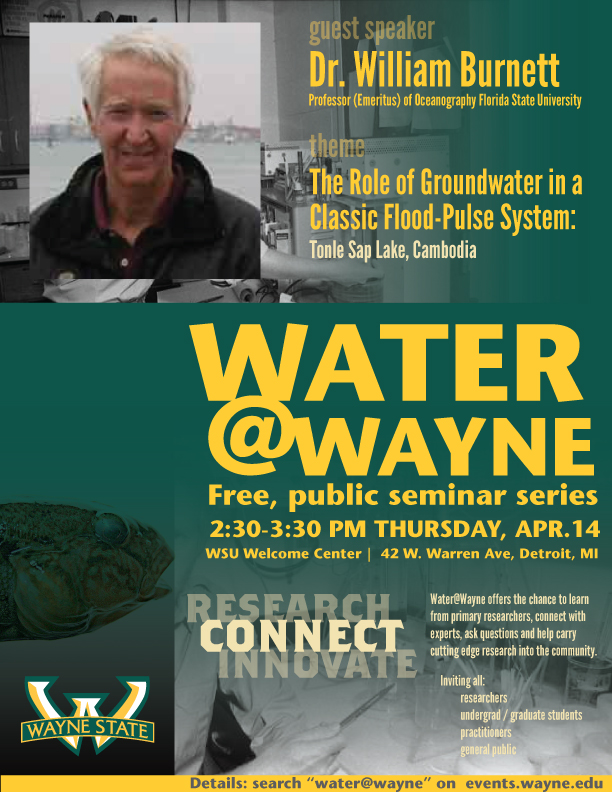
The Role of Groundwater in a Classic Flood-Pulse System: Tonle Sap Lake, Cambodia
Water@Wayne Seminar with Dr. William Burnett, Florida State University
Speaker: Dr. William "Bill" C. Burnett is a professor of Oceanography in the Department of Earth, Ocean and Atmospheric Sciences at Florida State University
Abstract: Tonle Sap Lake is the largest freshwater lake in SE Asia, and is reported to have one of the highest freshwater fish productions anywhere. The lake is a classic example of a "flood pulse" system. During the dry season (NovemberApril) the lake drains through a tributary to the Mekong River. The flow in the connecting tributary completely reverses during the wet monsoon (MayOctober), adding huge volumes of water back to the lake, increasing its area about fourfold. ... Our results suggest that the groundwater-derived dissolved inorganic phosphorus (DIP) contribution to Tonle Sap is more than 30% of the average inflows from all natural sources. Since the productivity of the lake is very likely phosphorus limited, this finding suggests that the role of groundwater is significant for Tonle Sap Lake and perhaps for many other flood pulse systems worldwide.
Speaker Bio: Dr. Burnett is the Carl Henry Oppenheimer Professor (Emeritus) of Oceanography in the Department of Earth, Ocean and Atmospheric Sciences at Florida State University. He has an M.S. (1971) and Ph.D. (1974) in Geochemistry from the University of Hawaii. Since joining the faculty of FSU in 1977, Dr. Burnett has taught ocean-related courses at both the undergraduate and graduate level and mentored >20 Ph.D. and M.S. students. During this period he developed a worldwide research program based on environmental radioactivity and especially the measurement of natural uranium and thorium decay-series isotopes in marine and terrestrial systems.
April 12, 2016
Speaker event hosted at the UM-Dearborn campus on April 12 gives an opportunity to learn about the newly-formed Great Lakes Water Authority from CEO Sue F. McCormick who will be speaking about the implementation of the new agency--challenges, opportunities.
RSVP to Bill Hatley, hatley@umich.edu.
Thursday, March 24, 2016 | 2:30 - 3:30 p.m.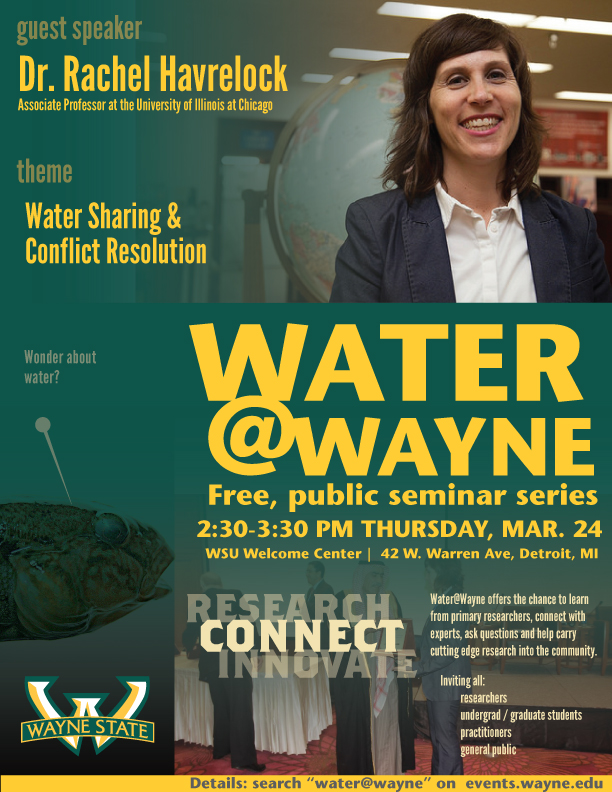
Water Sharing and Conflict Resolution
Water@Wayne Seminar with Dr. Rachel Havrelock, University of Illinois at Chicago
Speaker: Rachel Havrelock, associate professor of English at the University of Illinois at Chicago and author of River Jordan: The Mythology of a Dividing Line (University of Chicago Press, 2011)
Abstract: This presentation considers the new water geography of too little water in some regions and too much in others and reviews current state policies and private initiatives. With a focus on the Great Lakes, the talk maps the social dimension of access to clean water and distribution to toxins. It then presents models of community building and integration around water management and engages the audience in a discussion of the emerging politics of water.
This event is free and open to the public. Pre-registration is encouraged.
A short reception will immediately follow the presentation.
Thursday, March 10, 2016 | 2:30 - 3:30 p.m.
Chemical defense and offence: microbial taste-odor in source waters
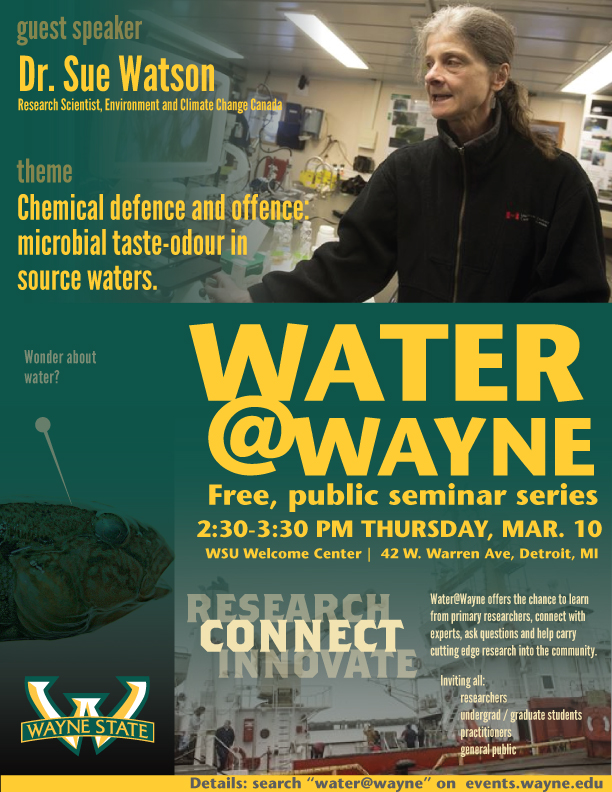 Water@Wayne Seminar with Dr. Sue Watson, Environment Canada
Water@Wayne Seminar with Dr. Sue Watson, Environment Canada
Location: Welcome Center Auditorium, 42 W. Warren, Detroit, MI 48201 | Map
Speaker: Dr. Sue Watson, research scientist with Environment Canada and adjunct professor at the Universities of York and Waterloo.
Abstract: Humans use taste and odor (T&O) to judge the safety and acceptability of water, and sudden changes in these qualities can initiate widespread public concern. Although commonly (mis) attributed to algal blooms, T&O often occurs in the absence of these events, produced by microbial volatile odour compounds (VOCs) emitted by a diversity of cyanobacteria ('blue-green algae'), algae, fungi and other microbiota in terrestrial (e.g. soil) communities and aquatic plankton, benthos and biofilms. Offensive T&O is in itself non-toxic, but has major, negative impacts, causing consumer distrust in potable supplies, off-flavours in fish and significant costs to water, tourist and recreational industries. Yet at the same time, can provide key information about immediate and long-term issues.
This event is free and open to the public. Pre-registration is encouraged.
A short reception will immediately follow the presentation.
Thursday, Mar 3, 2016 | 2:30 - 3:30 p.m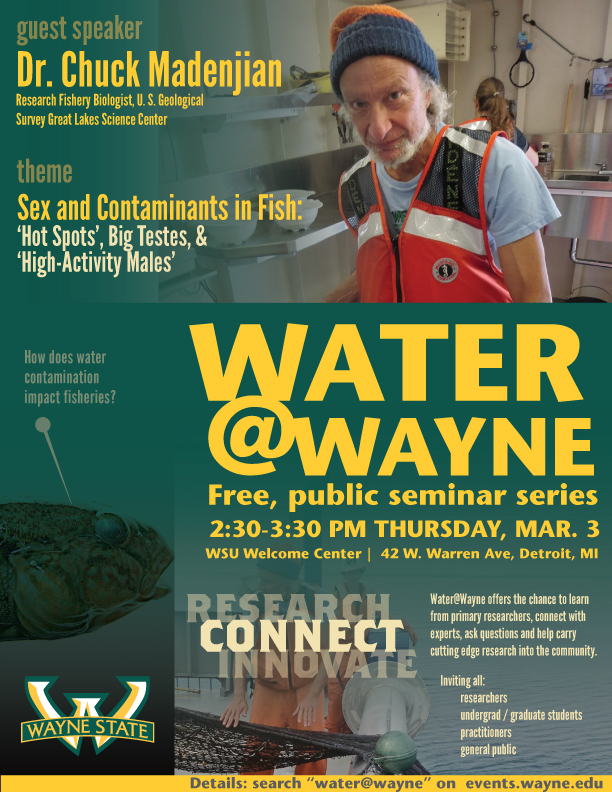
Sex and Contaminants in Fish: 'Hot Spots,' Big Testes, and 'High-Activity Mates'
Water@Wayne Seminar with Dr. Chuck Madenjian, USGS Science Center
Thursday, February 25, 2016 | 2:30 - 3:30 p.m.
Communication is Critical: Linking Water Research, Management, and Policy through Outreach and Engagement
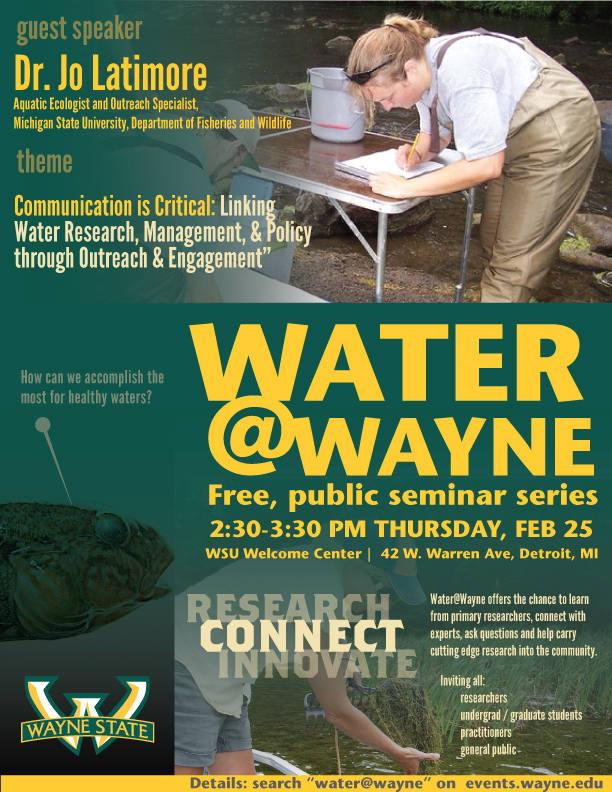 Water@Wayne Seminar with Dr. Jo Latimore, Michigan State University
Water@Wayne Seminar with Dr. Jo Latimore, Michigan State University
Location: Welcome Center Auditorium, 42 W. Warren, Detroit, MI 48201 | Map
Speaker: Dr. Jo Latimore, Aquatic Ecologist and Outreach Specialist in the Department of Fisheries and Wildlife, Michigan State University.
Speaker Bio: Dr. Latimore is particularly interested in public participation in assessment and management of Michigan's streams and lakes; science communication, outreach, and engagement; natural resources leadership development; and improving our understanding of aquatic ecosystem health by assessing responses to disturbance.
This event is free and open to the public. Pre-registration is encouraged.
A short reception will immediately follow the presentation.
Thursday, February 18, 2016 | 2:30 - 3:30 p.m.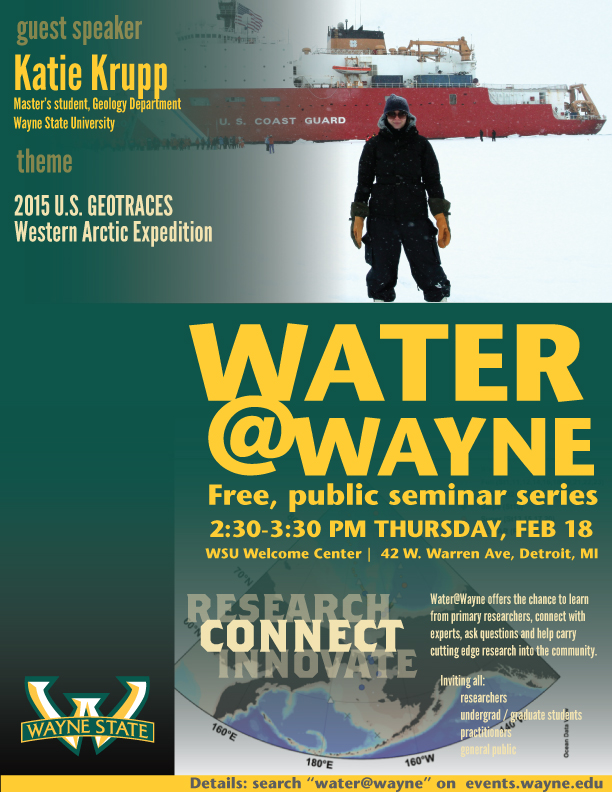
2015 U.S GEOTRACES Western Arctic Expedition
Water@Wayne Seminar with Katie Krupp, Wayne State University
Location: Welcome Center Auditorium, 42 W. Warren, Detroit, MI 48201 | Map
Speaker: Katie Krupp, Wayne State University Master's Student in Geology
Abstract: GEOTRACES is an international research program that aims to improve our understanding of biogeochemical cycles of key trace elements and isotopes (TEIs) in the World Oceans. The most recent endeavor of the U.S. GEOTRACES program led a team of investigators from a number of U.S. institutions, including MIT, Columbia, Princeton, Stanford, Woods Hole Oceanographic Institution and Scripps Institution of Oceanography, aboard the USCGC Healy through the western and central Arctic Ocean on a ten week research expedition. Katie Krupp assisted this team in measuring the in situ polonium-210 and lead-210 in aerosols, seawater, ice, and organic and inorganic particulate samples as a means to trace specific oceanographic processes as well as to date sea-ice and ice-rafted sediments. Her experience will be outlined in this presentation, which will detail the sampling procedures and analyses involved in this type of large-scale operation, as well as give a "tour" of day-to-day life working aboard a Coast Guard Ice-Breaker research vessel, including pictures that capture the beauty and wildlife of the Arctic.
This event is free and open to the public. Pre-registration is encouraged.
A short reception will immediately follow the presentation.
Thursday, February 11, 2016 | 2:30 p.m. - 3:30 p.m.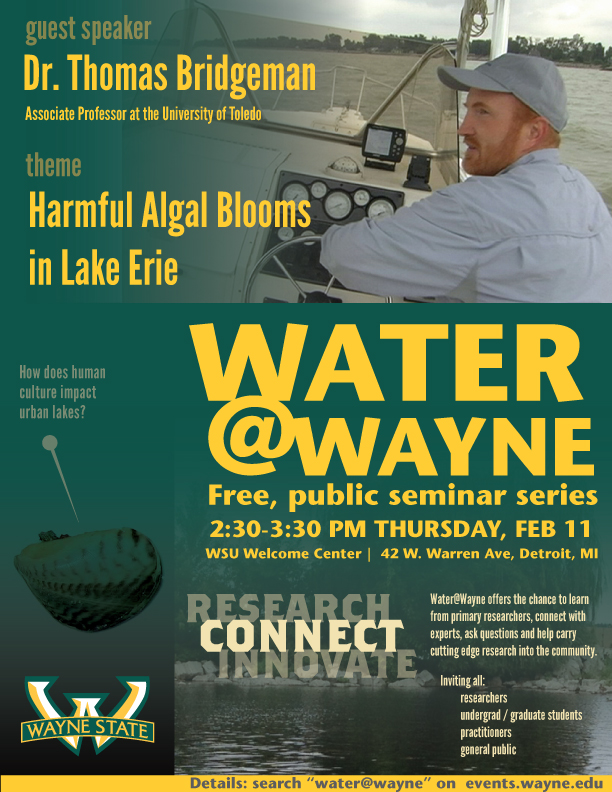
Harmful Algal Blooms in Lake Erie
Water@Wayne Seminar with Dr. Thomas Bridgeman, University of Toledo
Location: Welcome Center Auditorium, 42 W. Warren, Detroit, MI 48201 | Map
Speaker: Dr. Thomas Bridgeman, associate professor of Environmental Sciences at the University of Toledo.
Abstract: Toxic cyanobacteria have been increasing in freshwater bodies worldwide, resulting in Cyanobacterial Harmful Algal Blooms (CHABs).This presentation will trace the history of HABs in Lake Erie, in particular the return of Microcystis sp. blooms to the western basin since the mid-1990s, corresponding to changing watershed land use practices and weather patterns over the past two decades. The ecology of CHABs and role of limiting nutrients will be discussed as well as efforts to minimize the impact of CHABs through bloom prediction, early-warning systems, water treatment practices, and watershed management.
This event is free and open to the public. Pre-registration is encouraged.
A short reception will immediately follow Dr. Bridgeman's presentation.
Thursday, February 4, 2016 | 2:30 - 3:30 p.m.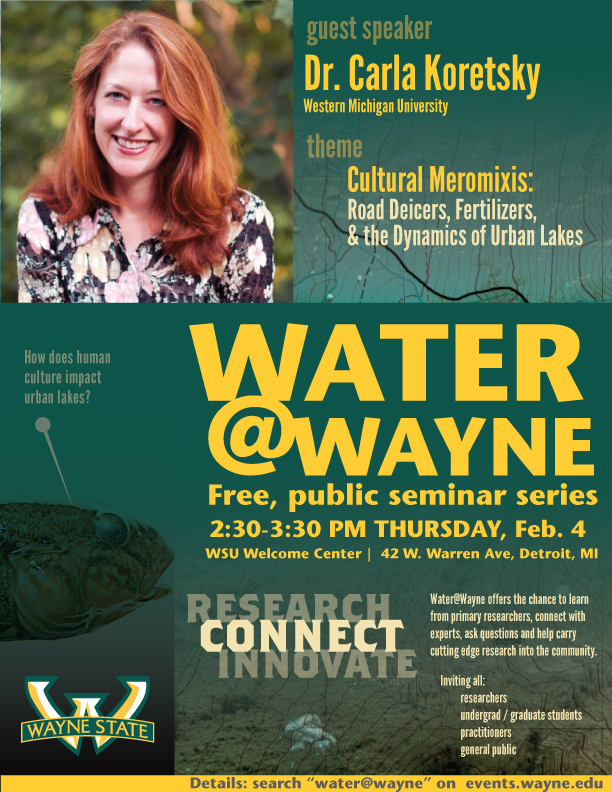
Cultural Meromixis: Road Deicers, Fertilizer and the Dynamics of Urban Lakes
Water@Wayne with Dr. Carla Koretsky, Western Michigan University
Location: Welcome Center Auditorium, 42 W. Warren, Detroit, MI 48201 | Map
Speaker: Dr. Carla Koretsky, Dean of the Lee Honors College at Western Michigan University and a professor in both the Geosciences department and the Environmental & Sustainability Studies program.
Abstract: The use of road salt deicers has skyrocketed in recent decades. Although these deicers make roads safer, they have significant impacts on natural systems. Dr. Koretsky will discuss her study that assessed the influence of road salt deicers on the sediments and lake column waters of two urban lakes in Kalamazoo, MI (Woods Lake and Asylum Lake) via both laboratory and field studies. This study clearly demonstrates that road salt deicers can significantly influence the biogeochemistry and physical functioning of urban lakes.
Speaker Bio: Dr. Koretsky is an expert in the fields of aqueous geochemistry and biogeochemistry. She and her students conduct field, laboratory and computer modeling studies to investigate the chemistry of wetlands and lakes, with a particular interest in better understanding the interactions of contaminants with natural waters, sediments and soils.
This event is free and open to the public. Pre-registration is encouraged.
A short reception will immediately follow Dr. Koretsky's presentation.
Thursday, January 28, 2016 | 2:30 - 3:30 p.m.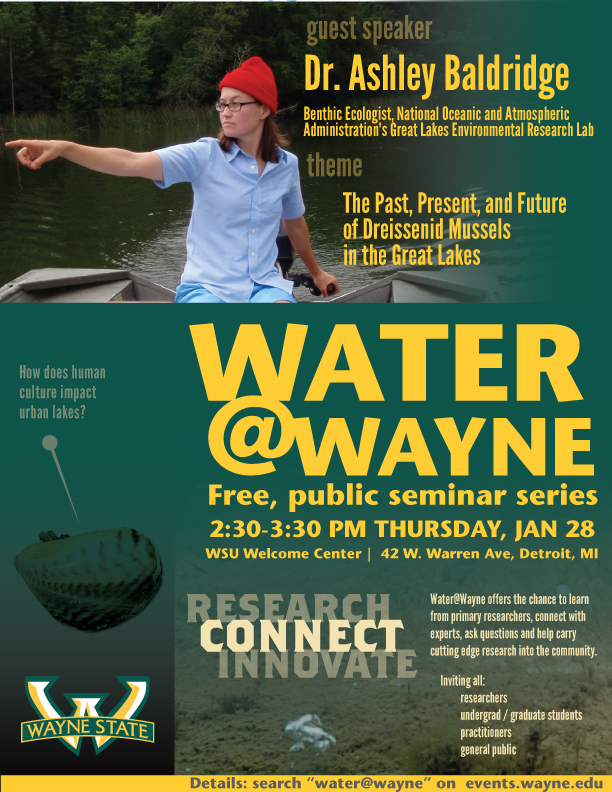
The past, present, and future of Dreissenid mussels in the Great Lakes
Water@Wayne Seminar with Dr. Ashley Baldridge
Location: Welcome Center Auditorium, 42 W. Warren, Detroit, MI 48201 | Map
Speaker: Dr. Ashley Baldridge, a Benthic Ecologist with the National Oceanic and Atmospheric Administration's Great Lakes Environmental Research Lab in Ann Arbor.
Abstract: The introduction of invasive zebra and quagga mussels (Dreissena polymorpha and D. rostriformis bugensis, respectively) has had profound impacts throughout the Great Lakes basin and other areas across North America. Dr. Baldridge will give an overview of the population growth and impacts of dreissenid mussels in different lake systems, present updated abundance data for Lakes Michigan, Ontario, and Huron, and describe some new frontiers of dreissenid mussel research. She will also introduce the newly formed Invasive Mussel Collaborative and recent advances in controlling dreissenid mussels.
Speaker Bio: Dr. Ashley Baldridge started doing research in Lake Michigan as a postdoc with the Cooperative Institute for Limnology and Ecosystems Research at the University of Michigan. She now manages the annual benthic survey program in Lake Michigan and collaborates on dreissenid mussel-related projects throughout the Great Lakes basin. Dr. Baldridge is originally from the U.P. and has lived within 50 miles of all five Great Lakes.
This event is free and open to the public. Pre-registration is encouraged.
A short reception will immediately follow Dr. Baldridge's seminar.
Thursday, December 10, 2015 | 2:30 - 3:30 p.m.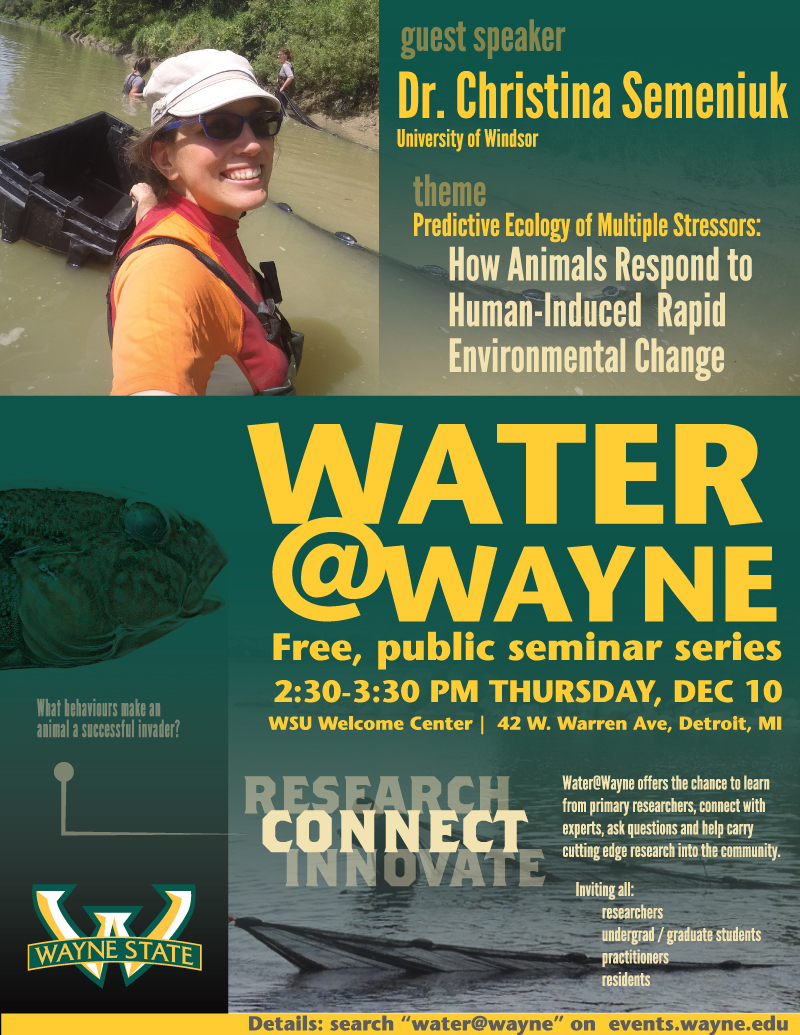
Predictive Ecology of Multiple Stressors: How Animals Respond to Human-Induced Rapid Environmental Change
Water@Wayne Seminar with Dr. Christina Semeniuk, University of Windsor
Location: Welcome Center Auditorium, 42 W. Warren, Detroit, MI 48201 | Map
Speaker: Dr. Christina Semeniuk, assistant professor in the Great Lakes Institute for Environmental Research at the University of Windsor.
Abstract: With the Laurentian Great Lakes experiencing human-induced, rapid environmental change from a variety of stressors, the following questions are of critical importance, and ways to investigate their impact will be addressed: What behaviors make a native species resistant to multiple stressors? What behavioral repertoires are most suitable to aquaculture? What behaviors make an animal a successful invader? What behaviors make for successful reintroductions? Dr. Semeniuk argues that predictive-ecological models based on behavioral decisions of animals can lead to unexpected but critical findings of management consequences that cannot be derived without considering the adaptive potential of individuals.
Speaker Bio: The driving force for Dr. Semeniuk's research program is a focus on how human disturbance affects adaptive decisions of organisms as they attempt to optimize competing fitness-maximizing goals, and how these resulting tradeoffs ultimately modify the persistence and resilience of wildlife populations.
This event is free and open to the public. Pre-registration is encouraged.
A short reception will immediately follow Dr. Semeniuk's presentation.
Thursday, November 12, 2015 | 2:30 - 3:30 p.m.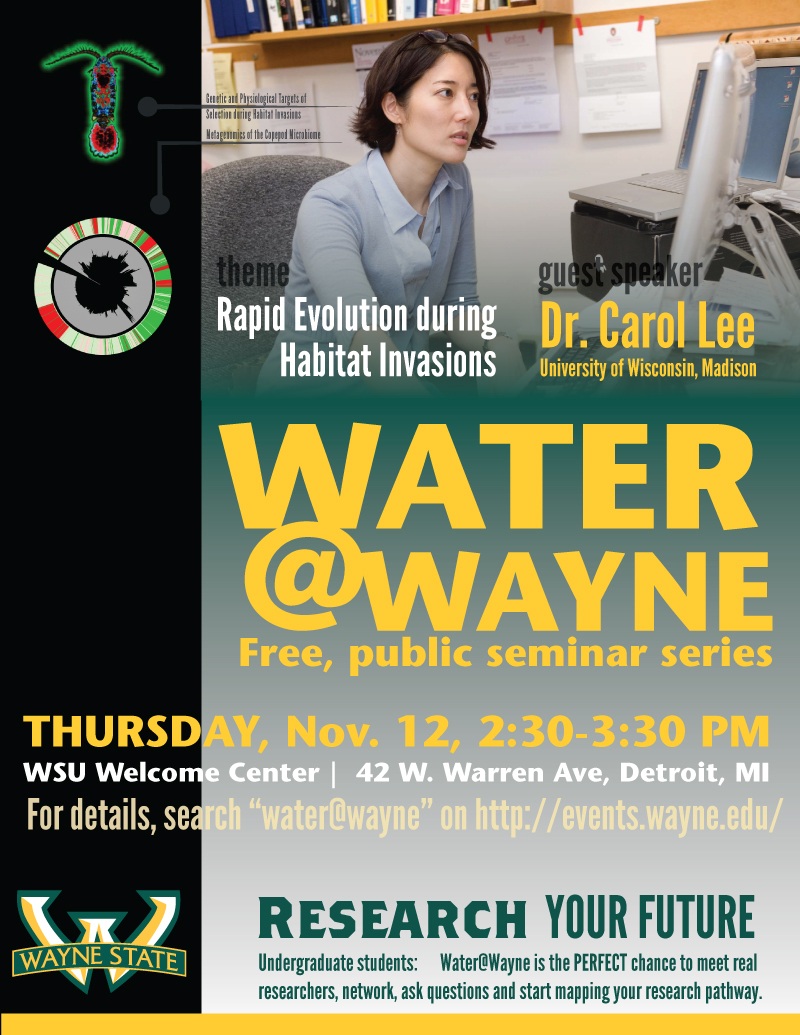
Rapid Evolution during Habitat Invasions
Water@Wayne with Dr. Carol Lee, University of Wisconsin, Madison
Location: Welcome Center Auditorium, 42 W. Warren, Detroit, MI 48201 | Map
Speaker: Dr. Carol Lee, professor in the Department of Zoology at the University of Wisconsin, Madison.
Abstract: Marine to freshwater transitions constitute major evolutionary events in the history of life, serving as stepping-stones for the colonization of land. Invasive species are often striking in their capacity to extend their ranges into novel habitats, providing valuable models for studying incipient adaptations during colonization. Dr. Lee is exploring interactions among key factors underlying freshwater adaptation and are probing transcriptional responses of the copepod to these factors, as well as shifts in its microbial metagenome as it invades.
Speaker Bio: Dr. Lee's research has focused mainly on rapid evolution during rapid environmental change, including during biological invasions and in response to environmental assaults, such as pollution and environmental stress. Her team has been documenting the physiological changes that occur during environmental change, and the underlying evolutionary changes at the genetic and genomic levels.
This event is free and open to the public. Pre-registration is encouraged.
A short reception will immediately follow Dr. Lee's presentation.
Thursday, October 29, 2015 | 2:30 - 3:30 p.m.
"Impact, Distribution and Prevention of Waterborne Infections in Urban Populations."
Water@Wayne Seminar with Dr. Paul Kilgore, Wayne State University
Location: Welcome Center Auditorium, 42 W. Warren, Detroit, MI 48201 | Map
Speaker: Dr. Paul Kilgore, associate professor of Pharmacy Practice at Wayne State University.
Speaker Bio: Dr. Kilgore's research is on waterborne infectious diseases, exposure risk and public health interventions, particularly in the Great Lakes region. Academically, he focuses on bacterial and viral infectious diseases across the lifespan.
This event is free and open to the public. Pre-registration is encouraged.
A short reception will immediately follow Dr. Kilgore's presentation.
Thursday, October 15, 2015 | 2:30 - 3:30 p.m.
Contaminants of Emerging Concern and their Relation to the Structure and Function of Bacterial Communities
Water@Wayne Seminar with Dr. Joseph Duris, US Geological Survey
Location: Welcome Center Auditorium, 42 W. Warren, Detroit, MI 48201 | Map
Speaker: Dr. Joseph Duris, Water Quality Specialist for the U.S. Geological Survey at the Michigan Water Science Center in Lansing.
Abstract: In the last 15 years, understanding of the occurrence, distribution, and type of contaminants of emerging concern (CECs) has grown immensely. With the advent of advanced analytical techniques and a growing amount of ancillary information related to CEC occurrence, it is now more feasible to assess the relations and effects that CECs have with bacteriological receptors in the environment. This talk will provide a framework for USGS investigations into the relation between CECs and bacteria in the environment and will summarize work from multiple studies investigating these relations.
Speaker Bio: Dr. Duris' research interests include understanding how human practices, including agriculture and urbanization, affect the occurrence, distribution, and fate and transport of nutrients, sediment, trace organic compounds, and pathogenic bacteria in surface water.
This event is free and open to the public. Pre-registration is encouraged.
A short reception will immediately follow Dr. Duris' presentation.
Thursday, October 8, 2015 | 2:30 - 3:30 p.m.
Using a Marginal Emissions and Impacts Factors Framework for Policy decisions: Applications to Renewables, Storage, Buildings and Data Centers
Event: Water@Wayne Seminar with Dr. Ines Azevedo, Carnegie Mellon University
Location: Welcome Center Auditorium, 42 W. Warren, Detroit, MI 48201 | Map
Theme:
Speaker: Dr. Ines Azevedo, associate professor in the Department of Engineering and Public Policy at Carnegie Mellon University.
Cost: Free
Abstract: What is the increase or decrease in climate, health, and environmental damages that occur when different interventions, such as renewables, storage, or energy efficiency measures are pursued in a region?
September 17, 2015 | 2:30 p.m. - 3:30 p.m.
"Untangling Urban Hydro-Systems with History & Chemistry"
Water@Wayne Seminar with Dr. Daniel Bain, University of Pittsburgh
Location: Welcome Center Auditorium, 42 W. Warren, Detroit, MI 48201
Speaker: Dr. Daniel Bain, assistant professor in the Department of Geology and Planetary Science at the University of Pittsburgh.
Abstract: Water has long been a management challenge in cities. In humid areas, flood prevention and removal of waste water have resulted in development of evolving systems to move waters through the city, systems that are hard to predict using traditional hydrologic methods. These systems are being re-evaluated in recent efforts to address our aging infrastructure crisis with more sustainable solutions. This talk will discuss the use of historical and chemical analyses to clarify how urban water works, drawing in particular from case studies of Baltimore, MD and Pittsburgh, PA and further, exploring the implications for the continued movement toward more sustainable cities.
Speaker Bio: Dr. Bain and his students focus on the comprehensive assessment of human driven changes in environmental systems. Hydrology, geomorphology, biogeochemistry, ecology, and spatial analysis are combined to focus on fundamental landscape components, particularly fluvial (stream) and urban systems, over the last several centuries.
Thursday, September 3, 2015 | 2:30 - 3:30 p.m.
Keeping the Great Lakes Great
Water@Wayne Seminar with Raj Bajankiwar, International Joint Commission
Speaker: Rajesh Bejankiwar, scientific advisor for the International Joint Commission (IJC)
Theme: "The Great Lakes Water Quality Agreement"
Abstract:
Key Issues impacting the Great Lakes result from storms and erosion; water level extremes and climate change; nutrients, habitat destruction, invasive species and other threats to water quantity and quality, such as an increasing population. The IJC works towards addressing these challenges not only in the Great Lakes Basin, but throughout all transboundary watersheds between Canada and the U. S.
Speaker Bio: Mr. Bejankiwar's key areas of research interest include nutrient enrichment, watershed management, surface and groundwater modeling and climate change impacts. He is also a lead author on the IJC's Lake Erie Ecosystem Priority Report (LEEP). He will present "The Great Lakes Water Quality Agreement."
Mr. Bejankiwar spoke to us about how the care of Great Lakes basin and connected watersheds shared by the United States and Canada with the help of the International Joint Commission (IJC) - a bi-national faction created as part of the "Boundary Water Treaty" between the two countries in 1909. The IJC works to protect the health of the Great Lakes and the health of those who depend on them in by addressing issues surrounding conflicts such as water shortages, distribution challenges, national ownership, harmful algal blooms, areas of concern (AOCs) and climate change. This presentation highlights key Issues impacting the Great Lakes that result from storms and erosion; water level extremes and climate change; nutrients, habitat destruction, invasive species and other threats to water quantity and quality, such as an increasing population.
Mr. Bejankiwar also brought two informative brochures produced by the IJC and available using the following links:
![]() Healing Our Waters, Great Lakes Restoration Conference in Chicago - Sept. 29, 2015
Healing Our Waters, Great Lakes Restoration Conference in Chicago - Sept. 29, 2015
Dr. Shawn McEllmurry speaks about green infrastructure with a positive impact on water quality. The conference was live-stream broadcasted by Detroit Public TV and can be viewed here.
September 11, 2015, 8:30am -5:30pm
Event: "Social Institutions and Sustainability" Interdisciplinary Research Symposium
Where: Wayne State University Undergraduate Library, 3rd Floor Community Room. Detroit, MI.
Event Abstract: Ongoing environmental and social changes, such as climate change, population shifts, and globalization, highlight the question of sustainabilityin terms of how communities may develop their human and natural resources, while ensuring long-term viability. This symposium centers on the role of social institutions vis-Ã -vis sustainable practices, noting their crucial role in setting socioeconomic trends, fostering public engagement, and diffusing innovations.
We define "social institutions" broadlyto include formal organizations that set societal agendas (e.g., governments, corporations, nonprofits, media, community groups), and institutionalized best practices of the contemporary social order (e.g., governance, due diligence, scientific rigor, risk management).
Research talks at the symposium examine how existing social institutions both restrict and enable the scope of sustainability; how they may be transformed by sustainable practices leading to newer, more adaptable institutions; and how sustainable solutions to specific problems have been facilitated by incorporating social components into their approach.
Keynote Speaker: Andrew Hoffman is the Holcim (US) Professor of Sustainable Enterprise at the University of Michigan, with joint appointments at the Ross School of Business and the School of Natural Resources & Environment.
Cost: Open and free to all WSU faculty, staff, and students
Host: Sustainability Scholars' Forum (SSF)
17 July 2015
Institute for Electronic and Electrical Engineers (IEEE) Humanitarian Technology Conference
UWERG member Dr. Carol Miller spoke as a panelist at the July 2015 (IEEE) Humanitarian Technology Conference in Livonia Michigan. She was accompanied by the Locational Emissions Estimation Methodology (LEEM) Team who presented two posters about LEEM, a big data tool that helps reduce air emissions related to electricity generation.
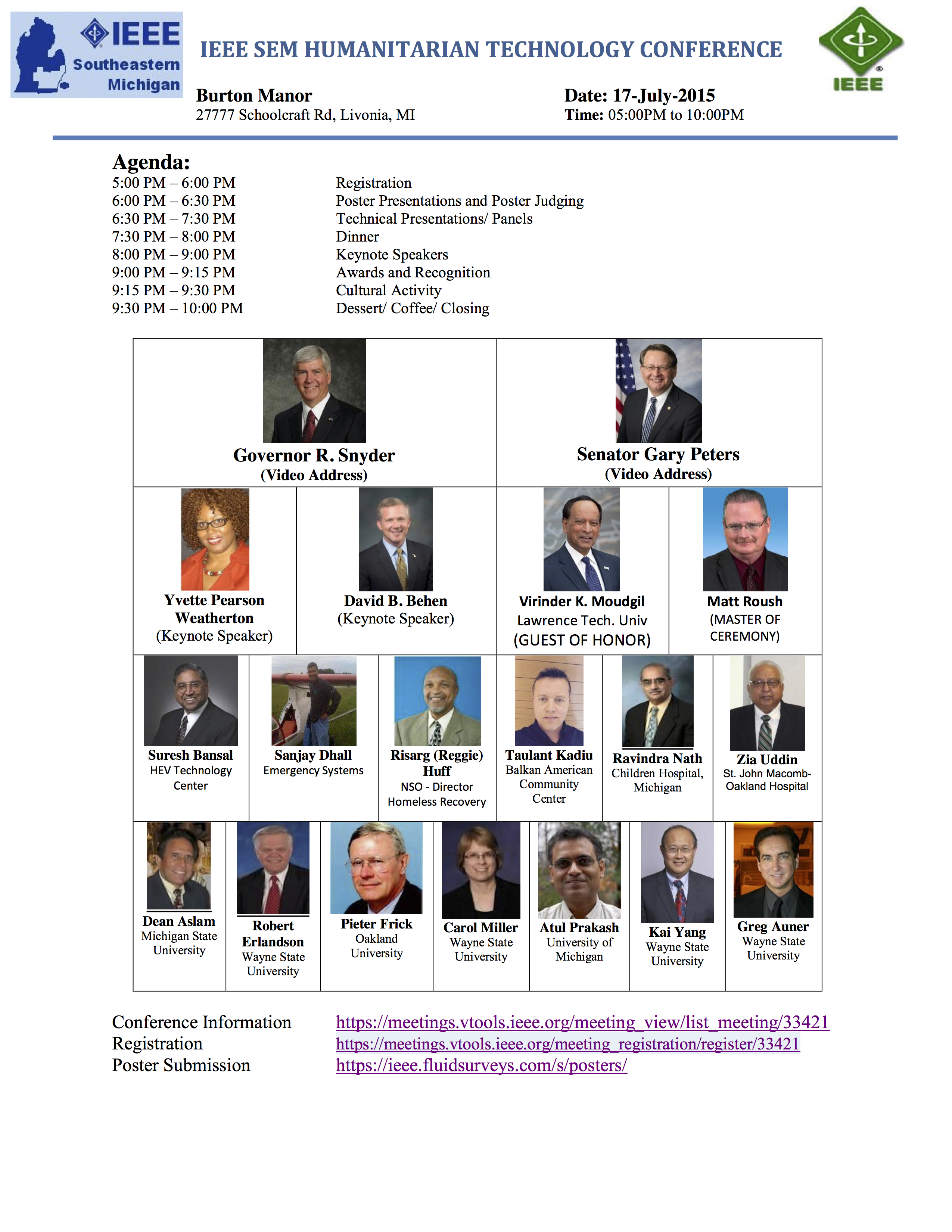
April 23, 2015
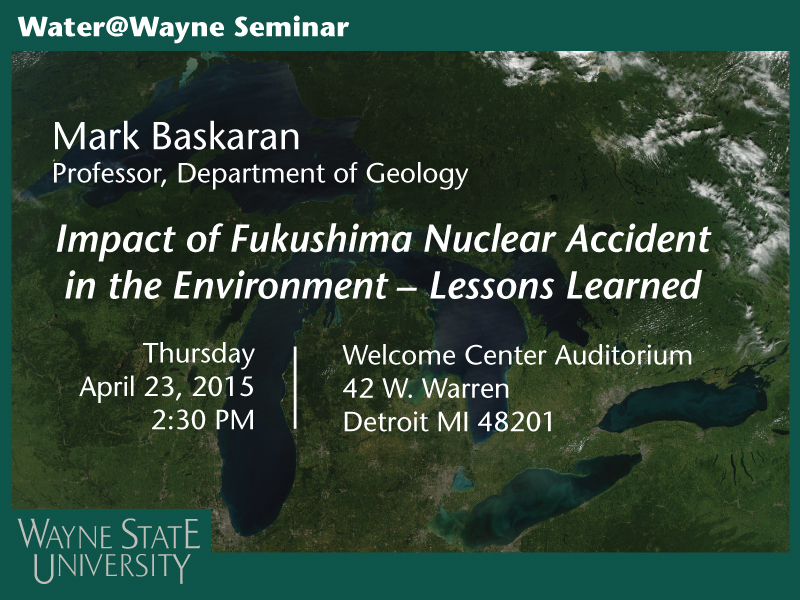
Event: Water@Wayne Public Seminar
Presenter: Mark Baskaran, Wayne State University, Department of Geology
Title of presentation: "Impact of Fukushima Accident in the Environment Lessons Learned"
Where: Wayne State University, Welcome Center Auditorium, 42 W. Warren, Detroit, MI 48201 | Map
When: April 23, 2015, 2:30pm-3:30pm
Cost: Free
Abstract: In 2011, a triple disaster, earthquake, tsunami and subsequent radiation releases at Fukushima Dai-ichi and their immediate impacts on human, environment and society were unprecedented in human history. In this presentation, an overview of studies of Fukushima-derived radionuclides in the atmosphere and ocean will be presented. The total amount of radioactivity released from Fukushima will be compared to natural amount present in the environment, amounts released from other nuclear accidents (Three Miles Island, Chernobyl) and other human-induced sources (nuclear reprocessing plants in U.K. and France). The temporal variations of radioactivity release and the concentrations of radio-cesium and strontium in the coastal waters and biota near Fukushima over the past 4 years will be presented. The radiation dose received by fish in the coastal water near Fukushima will be compared to that from the natural radiation dose. Ocean currents carrying the Fukushima-derived radioactive substances are expected to arrive west coast of North America later this year, and its potential impact on human health will be presented.
Hosts: Office of the Vice President for Research
April 30, 2015
Event: Water@Wayne Public Seminar
Presenter: Tammy Newcomb, Michigan Department of Natural Resources
Title of presentation: "Michigan's New Invasive Species Initiative"
Where: Wayne State University, Welcome Center Auditorium, 42 W. Warren, Detroit, MI 48201 | Map
When: April 30, 2015, 2:30pm-3:30pm
Cost: Free
Abstract: The Michigan Departments of Agriculture and Rural Development, Environmental Quality, and Natural Resources are working together to provide a holistic and coordinated approach to invasive species management in Michigan. The Michigan Aquatic Invasive Species Management Plan was recently revised and a new Michigan Terrestrial Invasive Species Management Plan is under development. The recently dedicated five million dollar General Fund investment in the prevention, detection, eradication, and management of invasive species provides for a tremendous opportunity by the State in collaboration with its partners to make serious strides in managing invasive species. The Michigan Invasive Species Grants Program, the state agency processes, and the framework for this initiative will be discussed.
Host: Donna Kashian
April 30, 2015
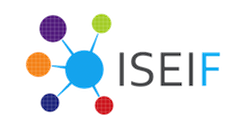 Event: ISEIF Surge Series 2015
Event: ISEIF Surge Series 2015
Presenters: Yann Kulp (VP of Residential Energy Solutions North America, Schneider Electric), Sce Pike (CEO & President, IOTAS), and Robert Schildgen (CEO, Priority Energy)
Title of presentation: Why Are Our Homes Still Dumb?
Where: Environmental Law & Policy Center
35 E. Upper Wacker Dr. #1600, Chicago IL
When: April 30, 2015
Cost: Free
Abstract: For years, we've been hearing about the smart/connected home and how it will improve the lives of consumers, including making them more astute users of energy. Despite the arrival of smart meters, connected appliances, and learning thermostats, widespread adoption remains slow. Join us for an evening of discussion with leading connected home experts as they share their perspectives on where we are, where we're going, and how we'll get there. Between energy generation and its usage, Schneider Electric provides technology and integrated solutions to optimize energy usage in markets like energy & infrastructure, industry, data centers, buildings and residential. IOTAS is the smart home experience designed specifically for renters. By partnering directly with property developers, they install and set up apartments with smart outlets, switches, and sensors before tenants move in. Priority Energy is a certified energy auditor dedicated to energy efficiency and conservation. Priority Energy not only provides energy rating/auditing services but is one of the only combined RESNET & BPI energy audit trainers in the Midwest.
April 17, 2015
Event: LEEM: Connecting Energy Consumption to Real-time Emissions Impacts Webinar
Where: Online
When: April 17, 2015, 1:00pm
Link to LEEM Webinar Flyer
April 9, 2015
Event: Water@Wayne Public Seminar
Presenter: Dana Kolpin, USGS Midwest Geosciences Group
Title of presentation: Contaminants of Emerging Concern: New Environmental Challenges
Where: Wayne State University, Welcome Center Auditorium, 42 W. Warren, Detroit, MI 48201 | Map
When: April 9, 2015, 2:30pm-3:30pm
Cost: Free
Abstract: Contaminants of emerging concern (CECs) encompass a vast array of understudied environmental contaminants (e.g. pharmaceuticals, hormones, personal care products and their transformation products) and are derived from a variety of natural, municipal, domestic, agricultural, and industrial waste sources and pathways to the environment. New analytical methods are continually being developed that are ever expanding the detection capabilities and therefore the scope and range of contaminants covered under this broad contaminant category. There is growing concern that such CECs may be bioactive and interactive (e.g. additive, synergistic, antagonistic effects) and potentially cause deleterious effects to ecosystem and human health. In particular, chronic, behavioral effects (e.g. altered predator avoidance patterns, etc.) are being documented following exposure to select CECs at environmentally relevant concentrations. This talk will summarize the latest CEC research being conducted by the USGS Toxic Substances Hydrology Program.
Bio: Dana Kolpin is a research hydrologist for the U.S. Geological Survey in Iowa City, IA. He received his B.S. from Iowa State University and his M.S. from the University of Iowa (both in geology). His research interests include the fate and transport of pharmaceuticals, hormones, and other contaminants of emerging concern in the environment. He has published over 100 papers and reports on environmental contaminants. He has been the project chief of the USGS Toxic Program's Emerging Contaminants Project since its inception in 1998.
Hosts: David Pitts, Shawn McElmurry
March 31, 2015
Event: "On the REV Agenda: The Role of Time-Variant Pricing Forum"
Presenter: Dr. Carol Miller, Wayne State University
Title: "Environmental Effects of Time-Variant Pricing" segment of the Time-Variant Pricing: Considerations Session
Where: NYU School of Law, Vanderbilt Hall Greenberg Lounge, 40 Washington Square South
When: March 31, 2015, 8:30am 4:00pm
2012-2013 Events
September 13, 2012
Dr. Robert Hecky
March 28, 2013
Susan McCormick, Director, Detroit Water & Sewerage Department, "Challenges and Opportunities in the DWSD Water System"
September 10-13, 2012
Great Lakes Week, Water@Wayne Seminar Series, 2011-2012 Academic Year
2010-2011 Events
December 1, 2010
"Asian Carp and Beyond" Seminar
Wayne State University, Detroit, MI
Student Center Ballroom
5221 Gullen Mall, 2nd Floor
Time: 7:00 to 9:00 pm
The IJC Great Lakes Regional Office and the WSU Urban Watershed Environmental Research Group (UWERG) are inviting students, faculty and the public to attend "Asian Carp and Beyond: Assessment, Prevention and Rapid Response to Aquatic Invasive Species" Seminar.
December 14, 2010
Detroit River Workshop
Tumors and Other Deformities in Fish, Birds and Wildlife of the Detroit River
Time: 1:00-4:00pm
Wayne State University, College of Engineering (EDC Auditorium)
Featured Speaker: Dr. Donna Kashian, WSU
Dr. Kashian is an assistant professor at Wayne State University and holds a visiting scientist position at the National Oceanic and Atmospheric Administration's Great Lakes Environmental Research Laboratory (NOAA/GLERL) in Ann Arbor Michigan. She is the principal investigator of the Fish Consumption Advisories Project funded by Michigan Sea Grant. She earned her PhD in Zoology at the University of Wisconsin examining the effects of organic compounds on reproductive and developmental endpoints in Daphnia. Her research has covered a diverse array of topics within ecotoxicology including examining the effects of wastewater effluent in the Great Lakes, investigating the response of Daphnia to toxaphene, developing a water quality biological monitoring program for Yellowstone and Grand Teton NP, examining the impacts of metals and ultraviolet radiation on benthic stream communities, and developing a novel screen for chemicals classified as endocrine disrupters.
Background to Workshop Series: The WSU Department of Civil and Environmental Engineering has established a partnership with the Friends of the Detroit River in order to develop a comprehensive strategy for the long-term betterment of the Detroit River habitat. WSU will host a series of workshops on delisting Beneficial Use Impairments (BUIs), for the Detroit River from December 2010 through March of 2011. The purpose of the workshops is to address current MDNRE delisting criteria for the BUI and to develop a series of proposed tasks that once executed, lead to the delisting of the BUI. The workshop discussions will be facilitated by WSU Adjunct Professor Kurt Heise. Mr. Heise has been involved in the development of the Action Plans for the Rouge River and Detroit River Areas of Concern, and has previously served as Director of the Wayne County Department of Environment. Representatives of the Friends of the Detroit River and other regional stakeholders have also been invited to attend. Active participation and recommendations will be sought by all participants to the event in an informal, conversational setting.
